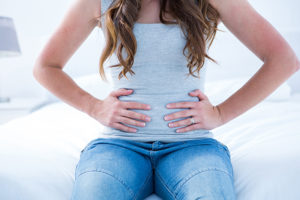 Uterine fibroids are much more common than you might think. About 30% of women in their 20s, 30s, and 40s are living with fibroids, it is estimated that about 50% of women experience them in their lifetime. Although the cause of the actual formation of the fibroid is unknown, the role of hormone imbalance involved in the growth of fibroids is well known. The main imbalance being estrogen.
Uterine fibroids are much more common than you might think. About 30% of women in their 20s, 30s, and 40s are living with fibroids, it is estimated that about 50% of women experience them in their lifetime. Although the cause of the actual formation of the fibroid is unknown, the role of hormone imbalance involved in the growth of fibroids is well known. The main imbalance being estrogen.
Uterine fibroids change with the amount of estrogen circulating in the blood. If estrogen increases, so do the size of fibroids. Obviously, this will change throughout the month of a woman’s cycle. But there are other factors in which estrogen is increased in the blood. Lifestyle has a huge impact on estrogen levels and estrogen metabolism.
Estrogen metabolism is what the body must do to breakdown excess estrogen and enable the body to get rid of it instead of trying to store it within the body. Most of the time, the liver is cleansing the blood of excess hormone, having to detoxify it, turning it into a form that can be excreted through the kidneys as urine or though bile which goes through the GI tract.
The GI tract houses the human microbiome; a person’s bacteria, viral, archaea, and eukaryote species that makes them their individual person. The microbiome has much to do with estrogen metabolism in the intestinal tract as well; this is the estrobolome. The estrobolome depends on the bacteria makeup; bacteria that actually use and metabolize estrogen. Some of the bacteria influence certain genetics that will turn the form of the estrogen ready to be excreted back into a form that can be re-absorbed through the intestinal wall. It is the estrobolome that contributes to the proportion of re-circulated and excreted estrogen and it’s metabolites. Greater reabsorption (genetic influence due to biome) of circulating estrogen leads to imbalances that can cause issues like uterine fibroids or even estrogen-driven cancers.
Things that highly affect the estrobolome (and microbiome in general) are:
- Any forms of excess hormones including bioidentical, birth control pills, and animal growth hormones
- A diet that includes artificial ingredients, preservatives, food dyes and chemicals
- A diet high in sugar and processed carbohydrates has been shown to reduce the good bacteria and feed the bad bacteria that make up the estrobolome; estrogen also has a huge impact on insulin and insulin sensitivity to cells.
- The use of antibiotics
- Chemical exposure of compounds that act as estrogens in the body (plant pesticides, harsh chemical cleaning products including degreasers, air fresheners, and dryer sheets, BPA linings on cans and bottles as well as paper receipts)
- Muscle mass to fat ratio has shown to be a factor in estrogen metabolism; however, this also has to do with genetic factors and the health of your microbiome
- A dirty or compromised liver; keep your liver clean- alcohol and chemical exposures as listed above will affect how estrogen is metabolized
- A diet low in healthy fats and Omega 3s and high in processed and industrialized fats will affect the building of new hormones
- Poor elimination and bowel movements (constipation and diarrhea)
So what do you want to do if you have uterine fibroids or other symptoms that relate to excessive estrogen; also known as estrogen dominance issues?
- Eat a diet high in fresh, whole foods. These foods feed your good bacteria (microbiome) and are nutrient dense for cells to function optimally. Foods to concentrate on: dark leafy greens especially as well as most other vegetables, seeds, legumes, fruit, and some animal protein.
- Nourish your liver with herbs like milk thistle and dandelion; limit alcohol, caffeine, and medications if possible as well as over the counter drugs- all of these impair the detoxification process that happens in the liver which will impair estrogen metabolism
- Ensure good bowel movement- this may mean adding a probiotic, a fiber supplement, magnesium
- Avoid excess sugar; sugar from fruits and vegetables are ok. Sugar from processed foods are not ok. Seriously- avoid them, find other “treats” and “rewards”
- Stress can wreak havoc on hormone balance; stress will alter the microbiome. Find outlets like yoga, other exercise routines, meditation, massage, acupuncture and other self-care habits to adopt into your lifestyle.
- In some cases, systemic enzymes have been shown to help with reducing uterine fibroids. Wobenzyme by Garden of Life is a great one and has also shown wonderful results in reducing inflammation, antibodies in autoimmune activity and repairing scar tissue
Read about Acupuncture’s success in fibroid treatment
If you experiencing uterine fibroids please let us help. The Acupuncturists can effectively treat fibroids with acupuncture, Chinese herbal medicine and sound nutritional guidance. Call us today for a free consultation. We have helped so many with this condition and are confident that we can help you too!
Amy Carlson is a Holistic Nutritionist who practices a whole-foods based approach in helping the body to heal and thrive. She has a strong interest in sharing what she has learned so that everyone has the opportunity to live in a healthy body. “Each body has the ability to heal if it is given what it needs and the understanding of why it is hurting is discovered and nurtured as well.” Learn more about her approach to wellness by visiting her website.

